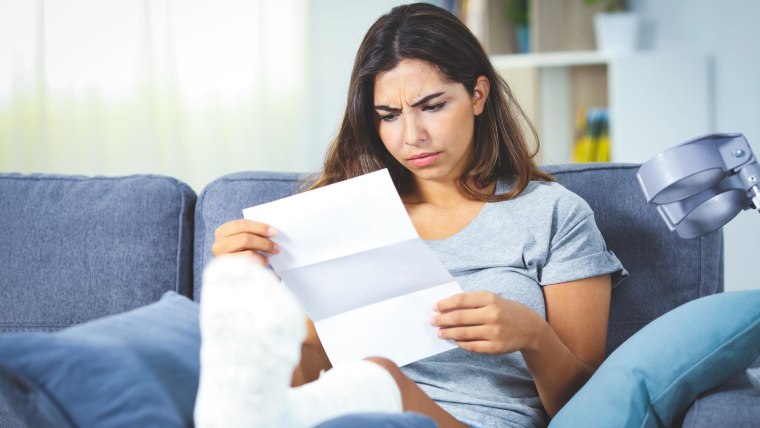The nation's unemployment rate will soon rise. If you lose your job, register unemployment and contact your card issuer
Summary
Millions of Americans have suddenly become unemployed due to the coronavirus pandemic. Here are some steps you can take if you lose your job and have credit card debit.
The country's unemployment rate is expected to rise due to the novel coronavirus pandemic and unprecedented social detachment measures that government officials have taken to slow the spread.
Through no fault of their own, millions of Americans have suddenly become unemployed. This particularly affects people who interact personally with customers: bartenders, waiters, retail employees, hotel employees and many, many others. The effects are enormous - for individuals, companies and our entire society.
The next official employment report from the Bureau of Labor Statistics will be released on April 3 and covers the month of March. The last report, released on March 6th, is a distant memory. The unemployment rate was only 3.5%, the lowest level in half a century. A robust 273,000 jobs were created in February.
The April 3 report will be grim. For example, the New York State Labor Department received over 2 million web visitors and almost as many phone calls last week. The Ohio unemployment website crashed after a record number of claims were reported. The Washington State Employment Security Department cited claims equivalent to the culmination of the Great Recession.
What to do if you are currently unemployed
Application for unemployment benefits as soon as possible.
Also, contact your credit card company and other lenders if you have trouble keeping up with your bills. Many card issuers offer relief in the form of fee exemptions and deferred payments. Ideally, you can do this without any additional interest. Ask about it.
And also try to protect your creditworthiness (changes approved by the lender, such as skipping a payment, shouldn't harm your credit, nor should more formal indulgence and disaster notes be included in your credit file).
Help is available, but only if you ask. It is much more likely that you will be successful if you register beforehand. Don't fall behind and try to fix this in a few months.
If you're having trouble getting to customer service by phone, try online chat or social media. Hopefully, a stimulus package from Congress will soon provide more support.
What to do if you have credit card debt?
I often recommend 0% credit transfer cards for people who get rid of credit card debt. The benefit of avoiding interest for up to 21 months is still huge, but the asterisk is that I think it will be more difficult to qualify for these cards.
In normal times, you could get a good credit transfer card with a credit score of around 670 or better. While card issuers are keeping their approval metrics very close to the waistcoat, I suspect they have become much stricter lately. It is also much more difficult to get a lower income credit card.
This makes sense since credit cards are unsecured debt. You are not putting your house or car on the line as security. Credit cards are often the first bills to be neglected in financial difficulties and the first debts to be paid in bankruptcy proceedings. This is an important reason why they charge much higher interest rates than mortgages and auto loans (often four to five times higher).
Use the past as a guide
The recession likely to emerge from COVID-19 will be different from the Great Recession - it will likely be deeper and shorter - but there are some notable lessons we can learn from the 2007/09 financial crisis.
According to the Federal Reserve, credit card debits (payments where criminal issuers have given up hope of ever seeing the money) peaked at 10.51% of funds in the fourth quarter of 2009. Credit card defaults (bills between 30 and 180 days late) peaked at 6.77% in the second quarter of 2009. After this peak, it took about a year for the defaults to return to a more normal level and about two years for the write-offs to complete.
At that time, credit card companies and other lenders were extremely cautious in their subscription decisions, and many card companies cut credit limits and even canceled cards entirely.
This particularly affected borrowers struggling with debt, unemployment and late payments. And unused lines of credit were considered liabilities because there was no telling when a dormant card could be brought to life with fees that might not be paid back.
All of this could very well happen again.
The answer of the card industry
While practically no one could have expected the COVID 19 crisis a year ago, 2019 was a cautious year in the credit card industry for other reasons. The banks feared that the record-breaking economic expansion (over 10 years) would soon come to an end, especially after a mix of measures by the US Federal Reserve and investor sentiment had inverted the yield curve. These concerns are proving to be true, albeit very different from what we all imagined.
Some of the measures that card issuers have taken (tightening credit standards, less generous credit lines and less aggressive marketing of new offers) should prove beneficial in our current crisis. Stricter regulations (such as the CARD law that came into force in 2010 and the CECL law that came into force a few months ago) should also help.
5 things to do if you have financial difficulties
To summarize it from a consumer perspective, a checklist follows:
Application for unemployment and other benefits, if any
Contact credit card companies and other lenders if you have trouble paying
Get a 0% credit transfer card if you have credit card debt and can be approved
Save cash, especially when it is limited - reduce unnecessary expenses, look for tax and event ticket refunds, and redeem credit card rewards
0% APR introductory cards are another idea if you can get one
Summary
Millions of Americans have suddenly become unemployed due to the coronavirus pandemic. Here are some steps you can take if you lose your job and have credit card debit.
The country's unemployment rate is expected to rise due to the novel coronavirus pandemic and unprecedented social detachment measures that government officials have taken to slow the spread.
Through no fault of their own, millions of Americans have suddenly become unemployed. This particularly affects people who interact personally with customers: bartenders, waiters, retail employees, hotel employees and many, many others. The effects are enormous - for individuals, companies and our entire society.
The next official employment report from the Bureau of Labor Statistics will be released on April 3 and covers the month of March. The last report, released on March 6th, is a distant memory. The unemployment rate was only 3.5%, the lowest level in half a century. A robust 273,000 jobs were created in February.
The April 3 report will be grim. For example, the New York State Labor Department received over 2 million web visitors and almost as many phone calls last week. The Ohio unemployment website crashed after a record number of claims were reported. The Washington State Employment Security Department cited claims equivalent to the culmination of the Great Recession.
What to do if you are currently unemployed
Application for unemployment benefits as soon as possible.
Also, contact your credit card company and other lenders if you have trouble keeping up with your bills. Many card issuers offer relief in the form of fee exemptions and deferred payments. Ideally, you can do this without any additional interest. Ask about it.
And also try to protect your creditworthiness (changes approved by the lender, such as skipping a payment, shouldn't harm your credit, nor should more formal indulgence and disaster notes be included in your credit file).
Help is available, but only if you ask. It is much more likely that you will be successful if you register beforehand. Don't fall behind and try to fix this in a few months.
If you're having trouble getting to customer service by phone, try online chat or social media. Hopefully, a stimulus package from Congress will soon provide more support.
What to do if you have credit card debt?
I often recommend 0% credit transfer cards for people who get rid of credit card debt. The benefit of avoiding interest for up to 21 months is still huge, but the asterisk is that I think it will be more difficult to qualify for these cards.
In normal times, you could get a good credit transfer card with a credit score of around 670 or better. While card issuers are keeping their approval metrics very close to the waistcoat, I suspect they have become much stricter lately. It is also much more difficult to get a lower income credit card.
This makes sense since credit cards are unsecured debt. You are not putting your house or car on the line as security. Credit cards are often the first bills to be neglected in financial difficulties and the first debts to be paid in bankruptcy proceedings. This is an important reason why they charge much higher interest rates than mortgages and auto loans (often four to five times higher).
Use the past as a guide
The recession likely to emerge from COVID-19 will be different from the Great Recession - it will likely be deeper and shorter - but there are some notable lessons we can learn from the 2007/09 financial crisis.
According to the Federal Reserve, credit card debits (payments where criminal issuers have given up hope of ever seeing the money) peaked at 10.51% of funds in the fourth quarter of 2009. Credit card defaults (bills between 30 and 180 days late) peaked at 6.77% in the second quarter of 2009. After this peak, it took about a year for the defaults to return to a more normal level and about two years for the write-offs to complete.
At that time, credit card companies and other lenders were extremely cautious in their subscription decisions, and many card companies cut credit limits and even canceled cards entirely.
This particularly affected borrowers struggling with debt, unemployment and late payments. And unused lines of credit were considered liabilities because there was no telling when a dormant card could be brought to life with fees that might not be paid back.
All of this could very well happen again.
The answer of the card industry
While practically no one could have expected the COVID 19 crisis a year ago, 2019 was a cautious year in the credit card industry for other reasons. The banks feared that the record-breaking economic expansion (over 10 years) would soon come to an end, especially after a mix of measures by the US Federal Reserve and investor sentiment had inverted the yield curve. These concerns are proving to be true, albeit very different from what we all imagined.
Some of the measures that card issuers have taken (tightening credit standards, less generous credit lines and less aggressive marketing of new offers) should prove beneficial in our current crisis. Stricter regulations (such as the CARD law that came into force in 2010 and the CECL law that came into force a few months ago) should also help.
5 things to do if you have financial difficulties
To summarize it from a consumer perspective, a checklist follows:
Application for unemployment and other benefits, if any
Contact credit card companies and other lenders if you have trouble paying
Get a 0% credit transfer card if you have credit card debt and can be approved
Save cash, especially when it is limited - reduce unnecessary expenses, look for tax and event ticket refunds, and redeem credit card rewards
0% APR introductory cards are another idea if you can get one







No comments:
Post a Comment